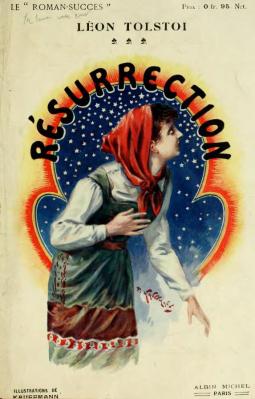[Please note: There is no need to stay the full 3½ hours of this event. Come when you’d like and leave when you wish. ]
How much stuff do you think you “own,” but really only have a limited license to use in specific ways? You may be surprised to learn who is restricting your freedom to innovate and share information. As software-driven products become more common, how can you be sure that your possessions aren’t working against you? Is that the price we have to pay to live in an advanced economy? It need not be.
Find out how software freedom fits into the “liberty means justice” political economy that we teach, why and how we use open source software wherever possible (and it almost always is). Discussion and videos presented in cooperation with the Free Software Foundation.
Meanwhile, to learn more about DRM and why it might be a bad thing, visit Defective by Design.
 Resurrection (1899)
Resurrection (1899)
By Leo Tolstoy
This late 19th-century novel about nobleman Dmitri Ivanovich Nekhlyudov’s efforts at redemption after a life of sin is Tolstoy’s last major novel before his death in 1910. The readers will have a complex relationship with the tormented protagonist and his desperate attempts at redemption and forgiveness, since Nekhlyudov’s misguided decisions and youthful errors are often not so dissimilar from our own. Resurrection is a scathing exposition of the myriad prejudices of the man-made justice system and the hypocrisy of the establishment, while it also explores the economic philosophy of Georgism – of which Tolstoy had become a strong advocate toward the end of his life. [from the Culture Trip]
Political Economy Book Club discussions are open to everyone interested, without charge, and the text (in English translation) is available free from various sources including archive.org, who also offer a free audiobook. There is also a more recent translation by Anthony Briggs, which can be purchased or licensed in various formats and is available in some public libraries. Any questions about the PEBC may be directed to Convenor Bob Matter,
Between 1948 and 1973, Americans’ real wages rose almost as fast as their productivity. After 1973, productivity grew 147% but wages rose only 19%. This raises two questions:
(1) If workers getting less, who is getting more?
(2) Is there a way to restore the balance?
To solve the problem of poverty, and the many other problems that follow from it, ordinary workers need higher wages. George Menninger describes how to raise wages without interfering in the free market and without taking anyone’s earnings.
George Menninger is an instructor at the Henry George School of Chicago, and attendees at this free program will have the opportunity to sign up for his Progress & Poverty course.
You can sign up for this free event thru Eventbrite, or RSVP directly by email.
In the 19th Century, Henry George proposed to end poverty by recognizing a clear and logical distinction between private property and community property. America took a different path, but George’s proposal remains valid and would still provide widespread prosperity. Chuck Metalitz explains.
Attendees at this free event will have the opportunity to sign up for the Progress & Poverty course which examines these ideas in much greater detail.
Between 1948 and 1973, Americans’ real wages rose almost as fast as their productivity. After 1973, productivity grew 147% but wages rose only 19%. This raises two questions:
(1) If workers getting less, who is getting more?
(2) Is there a way to restore the balance?
To solve the problem of poverty, and the many other problems that follow from it, ordinary workers need higher wages. George Menninger describes how to raise wages without interfering in the free market and without taking anyone’s earnings.
George Menninger is an instructor at the Henry George School of Chicago, and attendees at this free program will have the opportunity to sign up for his Progress & Poverty course.
No reservation is required, but you can let us know by email that you’re coming.
Between 1948 and 1973, Americans’ real wages rose almost as fast as their productivity. After 1973, productivity grew 147% but wages rose only 19%. This raises two questions:
(1) If workers getting less, who is getting more?
(2) Is there a way to restore the balance?
To solve the problem of poverty, and the many other problems that follow from it, ordinary workers need higher wages. George Menninger describes how to raise wages without interfering in the free market and without taking anyone’s earnings.
George Menninger is an instructor at the Henry George School of Chicago, and attendees at this free program will have the opportunity to sign up for his Progress & Poverty course.
No reservation is required, but you can let us know by email that you’re coming.
In the 19th Century, Henry George proposed to end poverty by recognizing a clear and logical distinction between private property and community property. America took a different path, but George’s proposal remains valid and would still provide widespread prosperity. Chuck Metalitz explains.
Attendees at this free event will have the opportunity to sign up for the Progress & Poverty course which examines these ideas in much greater detail.
